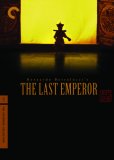| Reviews & Columns |
|
Reviews DVD TV on DVD Blu-ray 4K UHD International DVDs In Theaters Reviews by Studio Video Games Features Collector Series DVDs Easter Egg Database Interviews DVD Talk Radio Feature Articles Columns Anime Talk DVD Savant Horror DVDs The M.O.D. Squad Art House HD Talk Silent DVD
|
DVD Talk Forum |
|
|
| Resources |
|
DVD Price Search Customer Service #'s RCE Info Links |
|
Columns
|
|
|
Last Emperor - Criterion Collection, The
THE MOVIE:
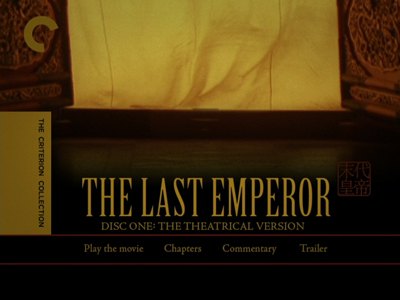
Bernardo Bertolucci's The Last Emperor is epic in every sense of the word. Sprawling in both running time and narrative time, it covers several decades of history, following the travails of one man and the grand events that dictate not only the course of his life, but affect the world stage. In 1988, the international production swept the Oscars, and has since stood the test of time, its gorgeous filmmaking still as impressive today as it was twenty years ago. Now, at long last, the movie is also getting the epic DVD treatment with the new 4-disc The Last Emperor - The Criterion Collection.
The Last Emperor is Pu Yi of China. Taken to the Forbidden City in 1908, the boy was crowned at the age of 3 at a time when the monarch was not permitted to leave the massive royal estate (it was called a "City" for a reason) as a matter of tradition. Before the new king even reached puberty, however, his nation changed underneath him, becoming a Republic and electing its own president. Very little changed for Pu Yi as far as his way of living. He was still surrounded by courtiers of whom he could make any demand, he just didn't have any sway over public policy. He was also now confined to his portion of the Forbidden City as a prisoner.
Bertolucci and screenwriter Mark Peploe explore the life of Pu Yi on two divergent timelines. The narrative of his growth from child king to empty figurehead regularly jumps forward to a framing timeline in the 1950s when Pu Yi was imprisoned by the Communists. Played as an adult by John Lone in both story lines, we see that the Emperor is a man who only knows a life of privilege and it takes a long time for him to lose the belief that it is his God-given right to rule. Though the Communist government's intention is to recondition Pu Yi and make him a productive member of their new society, they unwittingly end up serving as the final catalyst for turning a boy into a man.
Though Pu Yi left palace life as a young man, he was still very much a child. Not privy to the regular rites of passage experienced by most youths, his views of life all come second-hand, from his courtiers, from books and magazines, and from his British tutor, Reginald Johnston (Peter O'Toole). Pu Yi is married, but his conception of love is extremely adolescent. He has two wives: his true spouse Wan Jung (Joan Chen) and, essentially, his mistress, Wen Hsiu (Wu Jun Mei). He sleeps with them simultaneously, walks around with one on each arm, but has no conception that the Western world he longs to flee to would not look favorably on his living arrangements. When Wen Hsiu leaves him, he has no idea why.
This same naïveté is what also caused him to become a stooge of the Japanese, betraying China and helping its enemies set up a puppet government in Manchuria. By the end of WWII, Pu Yi realizes he has been duped, and Japan's loss of the war is what eventually leads to his imprisonment under the Reds. The heartbreak of adult life is visited on the child with explosive vigor.
And yet, by the end of his life, Pu Yi has become a real man, one who enjoys simple pleasures and has compassion for others. It's a hard-won transformation, but it's also a true one.
Bertolucci imbues The Last Emperor with an ostentatious splendor befitting his majestic subject. The sheer size of the Forbidden City demands that any production set inside it go large. The storytelling style could be compared favorably to the epics made by David Lean, though with less romanticism and stronger strains of real-world practicality. Pu Yi is never going to be a great hero, and his immaturity ends up being counterintuitive to his having a passionate romance, but his metamorphosis is almost like an epic in reverse, moving from grand illusion to peaceful actuality.
From the starting frame to the last, The Last Emperor is a beautiful movie. The multiple art directors, production designer, and costume designer have recreated the world of early 20th-century China. Vittorio Storaro's camera and his stunningly generous eye capture the rich colors and costumes with an exacting, unwavering attention. The cinematographer works across the open film, letting every frame burst with detail. It's a complete illusion. You are not only viewing the story, but you are there.
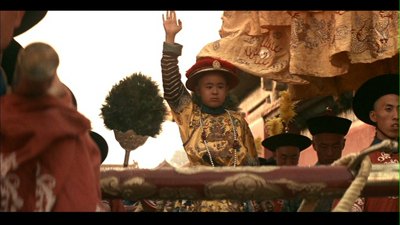
DVD 1 contains the 165-minute theatrical version of the film, which the director considers to be his preferred cut. The second disc is the 218-minute television cut, which isn't longer in order to restore pieces the Bertolucci had to remove against his will or better judgment, but simply a longer version made to take up more airtime and run as a TV event. (This also means removing the few instances of swearing.)
Essentially, it's the same film in structure and content. Some scenes are longer, and then some new elements are added, particularly in the prison sequences. For instance, in terms of extended scenes, Reginald Johnston's arrival is filled out with a conversation between the English tutor and the man he is replacing, Chen Paoshen (Victor Wong), in the car on the way to the palace. It serves to emphasize the sympathies of the Chinese teacher, who always had Pu Yi's best interests at heart, and thus brought Johnston as an aid for his young charge. Elsewhere, as an example of an added scene, we have a flashback where Pu Yi's wet nurse (Jade Go) tells the young monarch how she got her job. Other bits are far less substantial, just a reversed nip or tuck here and there.
In both cases, the restored footage adds color to the story, and The Last Emperor is still quite excellent in its longer form; nevertheless, the additions are neither crucial nor necessary. Comparing the two cuts actually shows how a good director and his editor can shape a movie into a stronger narrative by working out what is essential. The theatrical cut is a sharper picture, not as prone to meandering, and is arguably the better for it.
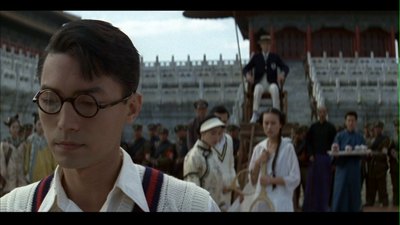
THE DVD
Video:
Vittorio Storaro oversaw this new high-def transfer, preserving The Last Emperor at a 2.00:1 aspect ratio. I can find no fault with the job done, Criterion has clearly taken meticulous care to fully realize this sumptuous movie. The colors are fantastic, and the clarity of detail impeccable. The only possible complaint is that the original aspect ratio for the film is actually 2.35:1 (and 70 mm prints were 2.20), and so there has been some cropping; what may have been lost, if anything substantial, is not evident. (It also appears that the wider framing was never the wish of the filmmakers, as explained by Criterion.)
Unless my eyes deceive me, however, it should be noted that I think the TV version is slightly less crisp and vivacious than the theatrical cut. I noticed some grain and even some edge enhancement, but it's only a small step down.
Sound:
The soundtrack for both cuts of the movie is mixed in 2.0 surround with subtitles for the deaf and the hearing impaired. Using the original audio elements and preserving the original sound balance works really well, and the movie has a marvelous aural atmosphere without needing to resort to multi-speaker trickery that would not have been part of the initial presentation in1987.
Extras:
The Last Emperor - Criterion Collection is a 4-disc package, bringing together new bonus material with vintage extras. The movies are stored in a handsome outer slipcase, with the interior housing being a four-sided folding box with a plastic tray for each disc. A thick 96-page booklet has a new essay by David Thomson, interviews with production designer Ferdinando Scarfiotti and actor Ying Ruocheng (the Communist prison guard), a look back from Bernardo Bertolucci, and excerpts from the production diary of Fabien S. Gerard, as well as a lot of photos, a chapter listing for both cuts of the movie, and a cast list.
DVD 1 is the original theatrical cut of The Last Emperor, along with the theatrical trailer. A full-length audio commentary with Bertolucci, producer Jeremy Thomas, screenwriter Mark Peploe, and composer/actor Ryuichi Sakamoto is also available as an added option for when watching the film. It was recorded during sessions in 2003 and 2007, with each person recording their pieces separately. Sakamoto speaks the least, and he doesn't emerge until the character he plays first appears on screen. The other men do a good job of covering all aspects of the production, with the producer being more about the devil in the details and the director being more heady and philosophical.
DVD 2 is given exclusively to the longer television version of the movie.

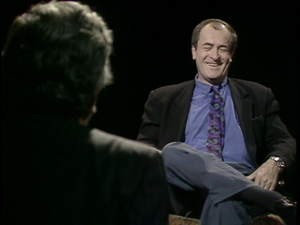
DVD 3 begins the supplementary material, with four separate documentaries about The Last Emperor.
1. The Italian Traveler, Bernardo Bertolucci (53 minutes), featuring the director on two sides of the world. The first portion of the film follows Bertolucci in the early 1980s during his last days in Europe before traveling to Los Angeles to start a production of Dashiell Hammet's Red Harvest. He visits locations from 1900 and Last Tango in Paris, and sees friends like Jonathan Demme, Jean-Pierre Leaud, and Gerard Depardieu. The film then picks up in China, after Red Harvest has fallen apart, as the director discovers the country and gets The Last Emperor underway. This documentary is by Fernand Moszkowicz, who shot Last Tango.
2. A 7-minute, 21-second collection of "postcard" images Bertolucci shot while scouting locations in China. Two audio options: the director's original narration or a new audio commentary reflecting on his travels.
3. The Chinese Adventure of Bernardo Bertolucci (51 minutes). A vintage making-of by Paolo Brunatti, following all aspects of production through script, shooting, composing the music, editing, and the first screening. Complete with lots of on-set footage from China and interviews with composers Ryuichi Sakamoto and David Byrne.
4. A new documentary (45 minutes) with contemporary interviews with Vittorio Storaro, editor Gabriella Cristiana, costume designer James Acheson, and art director Gianni Silverstri. These are very substantial, no-nonsense interviews about each person's specific job and what it was like to work with Bertolucci. It may be short on frills, but this is the kind of meaty bonus feature I wish we got more of, rather than all the backslapping and glad-handing that passes as substantive examination of film on most studio discs.
DVD 4 finishes up the collection of supplements with four more features.
1. A 66-minute episode of the BBC's The South Bank Show from 1987 that also covers the making of the film. This one has more extensive on-set footage than the other documentary, as well as interviews with cast and crew, including Pu Yi's surviving brother, who served as a technical advisor on the movie and is even portrayed as a character in it.
2. New interview with composer David Byrne (25 minutes). He discusses how he got on board and how it worked with having multiple composers. In addition to photos of Byrne with the Talking Heads and some production stills, we see the musician's production notes and sheet music, and we hear demo versions of some tracks, which are then compared to the final scenes in the movie.
3. Beyond the Forbidden City: Ian Buruma on China's Tumultuous Past (46 minutes), an exclusive historical look at the political turmoil and changing government powers in the first half of the 20th century in China. It's mainly Buruma's talking head next to maps, historical photos, and clips from The Last Emperor, and it fleshes out a lot of background detail only touched on in the script.
4. A 1989, half-hour episode of the BBC program Late Show: Face to Face. Jeremy Isaacs has a one-on-one interview with Bertolucci, probing him about his past, film theory, The Last Emperor's success, and what would be his next project, The Sheltering Sky. Much more of a personal and direct overview of the director than we get on the other extras.
FINAL THOUGHTS:
The Last Emperor - Criterion Collection is an impressive, gargantuan exploration of a modern classic. Bernardo Bertolucci's epic narrative about the boy king who found himself at the center of massive historical changes chronicles one man's journey from an enclosed world to a world far more open than anything he can fathom--and yet, with its own restraints, as well. Working alternate historical timelines, Bertolucci makes Pu Yi come alive, shooting for the first time in China's Forbidden City and matching that landmark detail for detail with equally gorgeous sets and costumes. Presented on four discs with two different cuts of the film, fans of grand moviemaking and history buffs will have a blast digging through the many supplemental features. The Last Emperor - Criterion Collection is a wonderful achievement in the DVD format, and Highly Recommended.
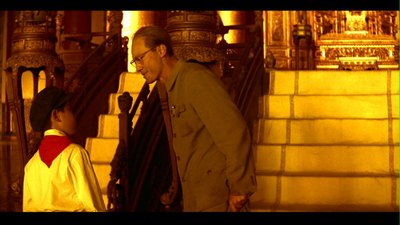
Jamie S. Rich is a novelist and comic book writer. He is best known for his collaborations with Joelle Jones, including the hardboiled crime comic book You Have Killed Me, the challenging romance 12 Reasons Why I Love Her, and the 2007 prose novel Have You Seen the Horizon Lately?, for which Jones did the cover. All three were published by Oni Press. His most recent projects include the futuristic romance A Boy and a Girl with Natalie Nourigat; Archer Coe and the Thousand Natural Shocks, a loopy crime tale drawn by Dan Christensen; and the horror miniseries Madame Frankenstein, a collaboration with Megan Levens. Follow Rich's blog at Confessions123.com.
|
| Popular Reviews |
| Sponsored Links |
|
|
| Sponsored Links |
|
|
| Release List | Reviews | Shop | Newsletter | Forum | DVD Giveaways | Blu-Ray | Advertise |
|
Copyright 2024 DVDTalk.com All Rights Reserved. Legal Info, Privacy Policy, Terms of Use,
Manage Preferences,
Your Privacy Choices | |||||||









